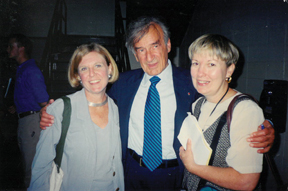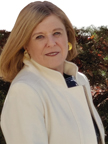
When Midwest Center for Holocaust Education (MCHE) founders Isak Federman, of blessed memory, and Jack Mandelbaum hired educator Jean Zeldin as its first executive director, they placed their vision of a center that would teach the history of the Holocaust in her hands. Twenty-six years later, Zeldin, after guiding MCHE through its infancy and establishing it as one of the most respected Holocaust centers in the country, is ready to pass the torch to another leader, she said.
As she recalled her time as MCHE’s executive director/chief executive officer, Zeldin noted that one of her proudest achievements “is that MCHE enjoys a reputation for integrity — locally, nationally and internationally — among donors, educators, historians and community nonprofits.”
One reason Zeldin worked so hard to make that happen: She didn’t want to disappoint Mandelbaum and Federman.
“They really didn’t know me, and I didn’t know them,” she explained. “They had made it a priority to hire an educator, but my learning curve went far beyond that into business and fundraising. We have been successful with the fundraising because of the cause, and because of Jack and Isak’s unconventional approach to raising major gifts from day one,” she explained.
As she prepares to retire, she believes she, and the staff — which now includes an associate director/director of education, historian, accounting manager, resource assistant and a temporary administrative assistant — have gone far beyond “what any of us envisioned in terms of activities and accomplishments and serving as the community’s key resource on the Holocaust.” Current board president Karl Zobrist agreed.
or Holocaust Education acted wisely when they named Jean Zeldin to be our first executive director,” Zobrist said. “Her diligence over the years has allowed MCHE to grow and flourish. We will always be grateful to Jean for her dedication to our mission.”
The search for a successor has begun, and if a new executive is hired soon, Zeldin’s last day could be Dec. 19. That’s a flexible date depending on who is hired and the amount of time needed for training and the transition. MCHE will hold an event in Zeldin’s honor early in 2020, at which time she plans to establish an education fund to which others may contribute.

MCHE’s strengths
MCHE’s first project has turned into what Zeldin believes is one of its biggest strengths. In 1993, MCHE initiated the “Witness to the Holocaust” project, in which 48 witnesses to the Holocaust were videotaped. In the ensuing years, those recordings have been used well.
“They don’t just sit on a shelf,” Zeldin said. “They are on our website. We have created thematic DVDs from them, and our program staff bases much of their teaching on those survivor narratives.”
Those testimonies taught Zeldin about survivors’ resilience.
“After hearing their stories, I marveled at how they got out of bed in the morning and put one foot in front of the other.”
Zeldin said her 24 years in the classroom came into play here. As a teacher, she “never really stopped to think about what happened after liberation or how to teach that.” Now MCHE provides that important information as well.
“The postwar story is amazing,” she said. “How the survivors moved forward, how they built their families and, in most cases, how they kept their faith.”
She’s proud of the teacher education program MCHE has created.
“We have educated hundreds of teachers from public schools, parochial schools and religious schools.”
Another of the center’s strengths is the partnerships it has created with more than 50 community nonprofits, including the Truman Library, the Kansas City Public Library, Union Station, the National Archives, the National World War I Museum and Memorial and the Negro Leagues Baseball Museum.
“We’ve developed deep relationships and mutual respect and aligned our missions to educate the public,” she noted.
MCHE’s relationship with the non-Jewish community is also one of its strengths. The founders understood that for MCHE to be successful, the Jewish community would need the non-Jewish community’s engagement and financial support to help educate about the Holocaust.
The diversity of MCHE’s board reflects the reputation the center holds throughout the community.
“At times, up to a third of our board has been comprised of people who are not Jewish. It does make a big difference. “
Zeldin also salutes the center’s dedicated staff.
“They’re smart and they’ll carry this through,” she said. “They know what they are doing, and they work well together. It’s a great team.”
She knows things will change when a new director takes charge.
“The staff will evaluate existing programs to see what’s working best and where some things can be improved,” Zeldin said, adding that some programs may be modified or discontinued so that others can be introduced. “There is a capacity issue. We are a small group.”
Memorable moments
Over the years, Zeldin has met and worked with a wide range of exceptional people from survivors to educators to celebrities. In her first year, as the only staff person, she attended every recording session of the survivors’ testimonies, spending more time at the studio than at the office.
Now a grandmother of seven, Zeldin’s children were in high school when she joined MCHE. One of her most memorable experiences was chaperoning Hyman Brand Hebrew Academy’s junior class, of which her daughter Jill was a member, on the March of the Living in 1996, traveling to historic sites in Poland and Israel.
Another highlight came in 2001, when Kansas City Star Books published “From the Heart: Life Before and After the Holocaust ~ A Mosaic of Memories,” based on Portrait 2000, an exhibit of 50 black and white photographs with accompanying text based on audio-taped interviews. Zeldin described it as a very special event for the survivors.
“The survivors literally autographed their pages in the book,” she reminisced. “They didn’t have a yearbook party. Only a handful were able to finish high school. At that event, they were celebrities. They loved it and the guests loved them.”
Still relevant today
From an educational standpoint, the Holocaust is a subject that absolutely should still be taught, Zeldin said.
“One would hope the world had learned enough that we would not be seeing contemporary genocides or hearing hate speech, that there would be more understanding, more compassion,” she said.
Yet that’s not the case today. People, fortunately or unfortunately, now see the relevance of the Holocaust perhaps more than they did at other points during the past 26 years, Zeldin said.
“There have been up and downs,” she said. “Ten years ago you would hear students ask, ‘Why do we need to learn this?’ or people would question the relevance or the emphasis. You don’t hear that so much anymore.”
Because of events in the past couple of years, such as neo-Nazis marching in the streets in Charlottesville, synagogue shootings and the rise in anti-Semitism, “people see the importance of teaching about the Holocaust without having to explain it to them,” Zeldin said.
Time is right to retire
After MCHE’s 25th anniversary gala last year, Zeldin said the center was in a solid financial position. That is one of the reasons why now is a good time begin the next chapter in her life.
“We have talented staff who have been with us anywhere from five to 16 years, so the organization is in a good place for that transition,” Zeldin said. “We’ve always had a passionate board and, because of the transition, they’ve become even more involved in strategic planning and more knowledgeable about the day to day operations.”
She believes that she is leaving MCHE in a good place, using an analogy credited to the Boy Scouts and to Barnett Helzberg that “you need to leave the campsite better than when you found it.” In Zeldin’s case, she, the founders and the board of the directors had to actually establish the campsite.
“It’s been a privilege to do this work and to have the confidence of the board, our donors and especially the survivors. So much of what we do is for them. MCHE is committed to carrying on their legacy.”
When retirement day rolls around, Zeldin, who is 72, will leave with no regrets.
“With broad community support, we have accomplished far more than what was first envisioned, especially considering the small size of our staff. While our core mission will remain grounded in teaching about the history and lessons of the Holocaust, bringing on a new executive director presents an opportunity to evaluate and expand existing programs and to define MCHE’s strategic goals moving forward.”
What does the future hold?
Zeldin wrote in MCHE’s last newsletter that she was leaving with mixed emotions.
“I will miss the day to day, I will miss the special events, (and) I will miss all the amazing people that I’ve come to know, including scholars, historians (and) our community partners,” she said. “I’ve had amazing opportunities locally, nationally and internationally. Every aspect of my position has been rewarding.”
With two careers spanning 50 years, she holds no illusions that the transition to retirement will be easy. She will need to set new goals and structure her days differently. That may mean purging closets, exercising, reconnecting with friends, conducting genealogy research, or — best of all — enjoying quality time with her grandchildren, including four who live in Leawood and three who live out of town.
Before writing her last newsletter article, Zeldin had a text exchange with her daughter in which she listed 17 items on her “when I retire” plate. Her daughter messaged, “Mom, why don’t I see ‘have fun’ on your list?” to which Zeldin replied that she would add, “be spontaneous” to the list.
Zeldin concluded that may be the biggest challenge for someone who describes herself as pretty regimented and calendar-dependent.


